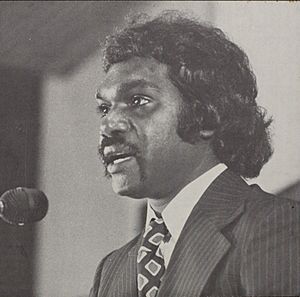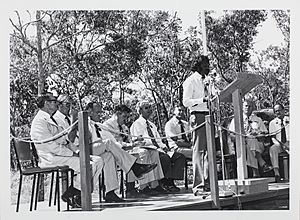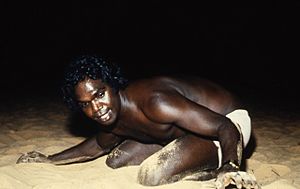Galarrwuy Yunupingu facts for kids
Quick facts for kids
Galarrwuy Yunupingu
|
|
|---|---|

Yunupingu in 1977
|
|
| Born | 30 June 1948 Melville Bay, Northern Territory, Australia
|
| Died | 3 April 2023 (aged 74) |
| Known for | Politics, music |
| Movement | Aboriginal land rights in Australia |
| Parent(s) | Mungurrawuy Yunupingu |
| Relatives | Mandawuy Yunupingu Geoffrey Gurrumul Yunupingu Djalu Gurruwiwi (brother-in-law) |
| Awards | |
Galarrwuy Yunupingu (born June 30, 1948 – died April 3, 2023) was a very important leader for Indigenous Australians. He was known for fighting for Indigenous land rights in Australia. This means he worked to make sure Aboriginal people had rights to their traditional lands.
He was a Yolngu man from the Gumatj clan. His home was in Arnhem Land in the Northern Territory. In 1978, he was named Australian of the Year.
Contents
Early Life and Learning
Galarrwuy Yunupingu was born on June 30, 1948. This was at Melville Bay, close to Yirrkala. He belonged to the Gumatj clan of the Yolngu people.
He went to the Mission School in Yirrkala when he was young. Later, he moved to Brisbane to study at a college for two years. He returned home to Gove in 1967.
Working for His People
Fighting for Land Rights
In the early 1960s, Galarrwuy Yunupingu joined his father, Mungurrawuy. They began working to get land rights for their people. He helped create the Yirrkala bark petitions. These were special documents asking for land rights.
He became well-known in the late 1960s. This was because of his part in the Gove Land Rights Case. This was a big legal case, but they did not win it. It was the first time Indigenous Australians tried to stop mining companies. They wanted to protect their traditional lands.
Yunupingu became a strong voice for Aboriginal people. Many people respected him across Australia.

In 1975, he joined the Northern Land Council (NLC). This group helps represent traditional Aboriginal landowners. He was the chairman of the NLC from 1977 to 1980. He was re-elected chairman in 1983. He led many talks with mining companies and the government.
He believed mining could help Aboriginal people. But it had to be on their terms. This meant sharing the money fairly. It also meant respecting the land and sacred sites. He once said, "We will continue to fight for the right to make our own decisions about our own land."
Later Work
In October 2004, Yunupingu stepped down as chairman of the NLC. He had been in that role for 23 years. He continued to speak about important issues.
In 2007, he talked about helping Indigenous people escape poverty. He also spoke about the need for good housing in 2009.
By 2009, he still lived near Yirrkala. He was a senior ceremonial leader and elder. He shared his experience with others. He worked to help his people achieve their goals.
In 2019, he joined a group of 20 leaders. This group helped design the Indigenous voice to government. This voice helps Indigenous people share their ideas with the government.
Later Life and Passing
In January 2010, he went to the hospital after collapsing. In late 2016, he had a kidney transplant.
Galarrwuy Yunupingu passed away on April 3, 2023. He was 74 years old.
Awards and Recognition
In 1978, Yunupingu was named Australian of the Year. This was for his talks about the Ranger Uranium Mine agreement. He said the award would help people see him differently. He felt it showed that Aboriginal people are important. He said they must share in Australia's future.
In 1985, he was made a Member of the Order of Australia (AM). This award was for his great work for the Aboriginal community.
In 1998, he was added to a list of "Australian Living National Treasures." This list honors leaders who have a big impact on society.
In 2015, he received an Honorary Doctor of Laws degree. This was from the University of Melbourne. It recognized his important work for Indigenous rights.
In 2017, Australia Post honored him with a special stamp. This was part of a series called "Indigenous leaders." It marked 50 years since the 1967 referendum.
Music
- "Gurindji Blues" (RCA Victor, 1971) with Vincent Lingiari and Ted Egan
 | Frances Mary Albrier |
 | Whitney Young |
 | Muhammad Ali |


